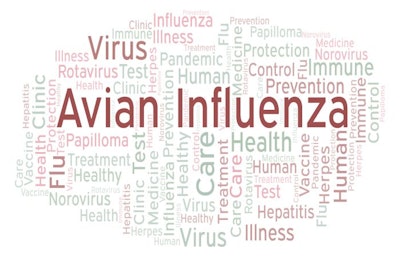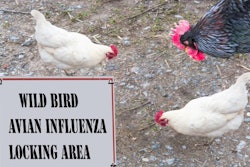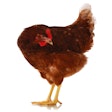
In its latest assessment, the European Food Safety Authority (EFSA) warns that there is now a high risk of highly pathogenic avian influenza (HPAI) outbreaks in currently disease-free countries in Europe.
At the start of last month, the same agency had issued a general warning for Europe based on reported outbreaks among poultry and wild birds in Russian and Kazakhstan.
Currently, the threat to human health is “very low,” according to EFSA. However, the nature of viruses to evolve represents a risk of transmission to the people. As the number of outbreaks in birds confirmed over the past month exceeds 300, EFSA has drawn attention to this possible future development.
“Preventing further escalation of these outbreaks will require close cooperation between animal, public, environmental and occupational health authorities — in other words, a One Health approach — across Europe,” said Nik Kriz, head of EFSA’s Animal and Plant Health Unit.
As well as close monitoring the genetic make-up of circulating viruses, EFSA is urging national veterinary agencies to continue surveillance of both wild and domestic birds, and to ensure control measures are enforced following any confirmed outbreak.
First avian flu confirmed in Croatia, mainland France, Italy, Slovenia
For the first time in more than three years, the H5N8 HPAI virus has been detected in Croatia.
According to the official report to the World Organisation for Animal Health (OIE), more than 4,300 meat turkeys died at a farm in Koprivnica-Krizevci last week. Located in the north of this southeast European country, this county borders Hungary.
The same virus has been detected in poultry at a pet store in the district of Yvelines in northern France, according to the national agriculture ministry. All the birds at the shop have been euthanized. The previous week, the first outbreak of the season was reported on French territory — on the island of Corsica.
In Italy, a low-pathogenic avian influenza (LPAI) virus of the H5 family has been detected for the first time since June of this year. According to the official health ministry report to the OIE, eight cases were detected among around 11,000 broiler chickens and ducks at a farm in the province of Pavia in the Lombardy region of northern Italy. The birds had shown neither symptoms of the disease, nor elevated mortality.
This week, a wild swan found dead on the coast of Slovenia has tested positive for the avian flu virus, according to the STA news agency. This was a first case of the season for this southeastern European nation that borders Croatia.
Sweden has confirmed its first HPAI outbreak for more than three years. Affected was a flock of 5,100 meat turkey in Ystad, according to the OIE report. Of the three poultry houses at the farm, birds in only one of the houses showed signs of the disease and elevated mortality. All 3,320 remaining birds have been culled. The affected farm is in Skåne, a county in the far south of the country.
Further outbreaks confirmed among European poultry
Following the recent discovery of HPAI virus-positive wild birds in the same area, the first outbreak in poultry has occurred in the German region of Lower Saxony. Affected was a backyard flock of 43 laying hens in the Aurich district, according to the federal agriculture ministry. Fourteen of the birds died, and the rest have been destroyed.
In the north German region of Schleswig-Holstein, the number of outbreaks of HPAI linked to the same H5N8 virus has risen to four. This followed confirmation to the OIE of two new outbreaks in the North Friesland district, which affected a total of 2,000 birds in mixed poultry flocks.
Over the past week, the agriculture ministry of the Netherlands has registered two new outbreaks of avian flu, affecting a total of 190,000 poultry. First to be confirmed was a broiler farm with 90,000 birds in Witmarsum (Friesland province), and this was followed by a flock of 100,000 laying hens in Hekendorp (Utrecht province).
More European wild birds test positive for HPAI virus
The first case of H5N8 HPAI in a wild bird has been confirmed to the OIE in the North Rhine-Westphalia region of Germany. Furthermore, virus-positive cases have also been reported for the first time in wild species in Berlin and Bavaria through the national animal disease reporting system, TSIS.
This week, the national veterinary authority of Belgium has registered with the OIE three more cases of HPAI in different districts of West Flanders.
Following earlier cases of H5N8 HPAI in wild and captive birds in the United Kingdom (U.K.), the agriculture department, Defra has reported to the OIE four new cases in wild species. These were found in Northern Ireland, as well as three English regions. A recent update indicated new cases in wild and captive birds in the counties of Leicestershire and Gloucestershire.
Asia: new cases in Japanese poultry, wild birds in South Korea
Total outbreaks of avian flu linked to the H5N8 virus variant in Japan now stands at eight, reports Japan Times. The latest cases have been confirmed in another poultry flock in Mitoyo city. Increased mortality was observed in the flock of around 77,000 chickens, and the rest of the flock will be culled. Pathogenicity of the virus is currently under investigation. Mitoyo is located in the prefecture of Kagawa on the island of Shikoku.
In South Korea, wild bird droppings at two news location have tested positive for the H5N8 HPAI virus, reports Yonhap news agency. Latest cases were in Icheon county in Gyeonggi province, and on the resort island of Jeju.
According to the same source, the agriculture ministry has ordered that all poultry in South Korea are kept housed until February of next year. The measure aims to protect free-range chicken and duck flocks from the risk of picking up the infection from wild birds.
View our continuing coverage of the global avian influenza situation.


















